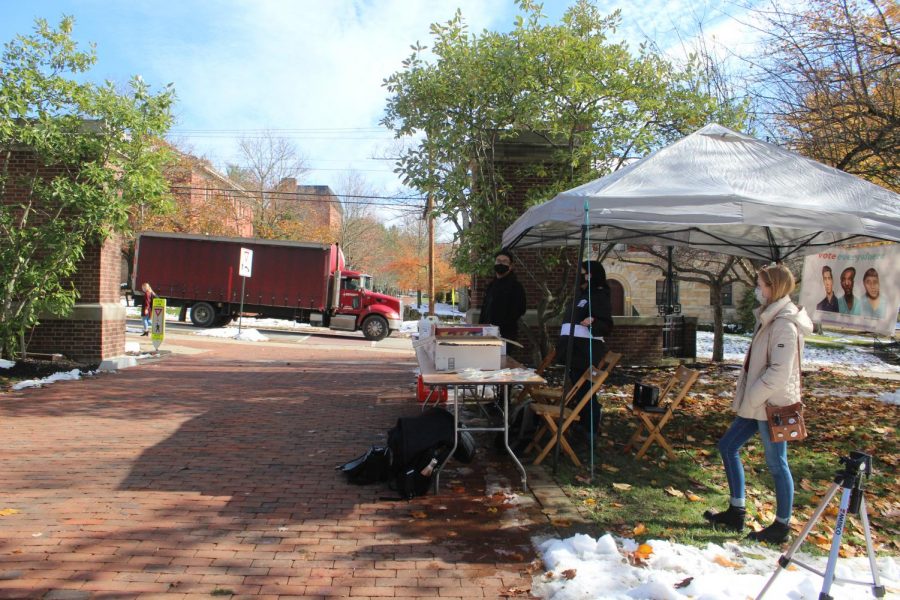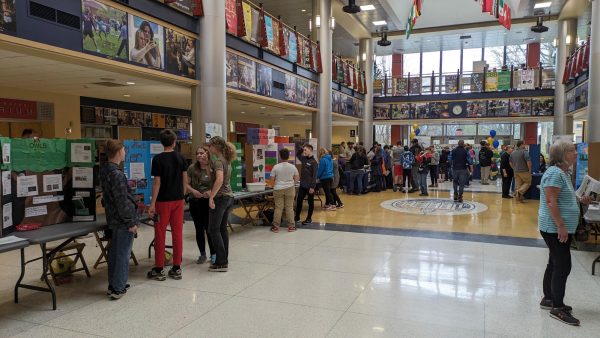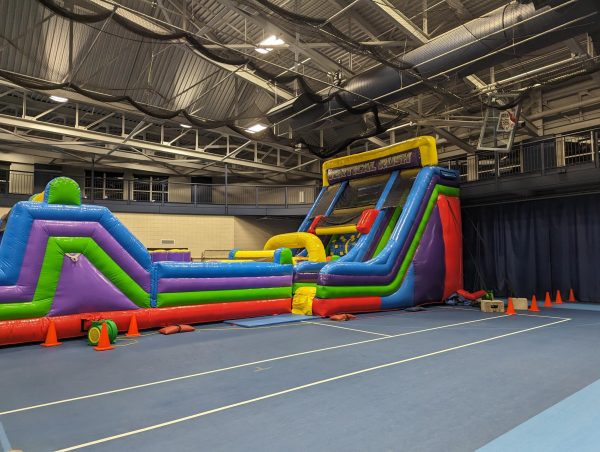CPP, Andrew Goodman Foundation hold Election Day activities
The Center for Political Participation and the Andrew Goodman Foundation hosted Election Day activities last Tuesday Nov. 3, including busing students to the polls, handing out t-shirts and snacks, and a watch party in Quigley Auditorium.
From 8 a.m. until 8 p.m., the two organizations ran a booth and regular busing to the polls in Meadville at the Samuel Lord Gate on the Brooks Walk. Emma Godel ’21, a CPP fellow, noted that in-person turnout this year was very limited in scope.
“We (didn’t have) a lot of people go on buses, and I don’t think that’s a bad thing,” Godel said. “We’ve had a lot of people come to us saying, ‘I’ve already voted by mail,’ and usually we don’t care where or how you vote, but with this pandemic in mind, we’re really excited to see so many people take advantage of mailing in a ballot rather than voting in person.”
The shift to mail-in voting is something the CPP itself was partly behind.
“We have already encouraged students to vote by mail if they can,” said Olivia Brophy, ’23, another CPP fellow. “We (expected) a lower turnout for voting in person than a normal election year, because of (COVID-19). I and many of my friends (had) already voted by mail, but I do know of a small number of people that (planned) to go vote in person in Meadville.”
For students who did vote in person, safety measures were in place to ensure that the virus did not spread. All voters were required to wear facial coverings and bus seating was arranged to encourage social distancing.
Around 1:30 p.m., Matthew Ferrence, associate professor and chair of the English Department, visited the booth. Ferrence ran for the 6th District seat in the Pennsylvania House of Representatives.
“It’s Election Day, and I’m on the ballot, and this is my home turf as a professor at Allegheny College,” Ferrence said. “I’m not really campaigning here, I’m out here to see the energy that the Center for Political Participation (has in) doing this bipartisan work to do what we need to do every election, which is to get out and vote for the world we want.”
Ferrence will most likely lose his election, with the current numbers being 74% to 26% as of Thursday Nov. 5, and likely isn’t going to run again in 2022.
“My ambition is not really to be a politician, my ambition is to bring representation to this district,” Ferrence said. “I’m not looking at this as, ‘I’ll keep throwing spaghetti against the wall until it sticks.’ This is the run I’m taking, it’s my turn to step up, and I hope someone else will be willing to take that turn after me.”
Increasing voter turnout is a major goal of the Andrew Goodman Foundation, which was created in 1966 by the parents of Andrew Goodman, a college student who was working to expand the vote for African Americans when he was murdered by the Klu Klux Klan in 1964. In addition to helping with Election Day busing, the Andrew Goodman Foundation also pushes other measures to help increase voter turnout.
“We pushed a policy for Election Day to be moved to Gator Day, and if not that, then no classes on Election Day, and it passed,” said Amya Ruiz, ’20, an Andrew Goodman ambassador. “Moving forward, Allegheny should not be having classes on Election Day, and that is due to the work of Andrew Goodman Foundation ambassadors.”
This year, the Andrew Goodman Foundation also arranged for chaperones, drawn from the faculty and staff of Allegheny College, to accompany voters — particularly voters of color — to the polls.
“We thought it would be extremely culturally incompetent to ignore the high racial tensions with this election, and concern for danger, not feeling safe,” Ruiz said. “We thought it would be really distasteful to continue busing to the polls as usual, especially with (the) many threats of violence that students have heard or seen all over the world and in America. That’s why we gathered some volunteers to be able to do that for students.”
Godel concurred, and noted that there have been specific incidents in the past at Meadville’s polling precincts.
“I don’t vote at that precinct so I’ve never seen these poll workers in action, but they try and question their registration status, try and invalidate their ID in some way,” Godel said. “I think it’s great to have some chaperones there to reinforce students who might not feel comfortable voting alone.”
Prior to the election, there had been anecdotal reports of alleged voter intimidation and politically-motivated aggression, including an incident where a caravan of Trump supporters surrounded a Biden campaign bus.
“We as students are not trained and prepared to be able to de-escalate a situation, but we do have the resources to call people who are,” Brophy said. “If there are any instances of voter intimidation, harassments, or anything like that at the polls, or on campus, we are fully prepared to call public safety, to call other adults who are trained in de-escalation to be able to make sure that students feel their voice is heard and that their voice is necessary.”
For future elections, Brophy asked that students continue to be informed when they make their decision.
“Be educated,” Brophy said. “Read up on your candidates, really know who you’re voting for, because it matters. The presidential election, obviously, but your local candidates have such an impact on your community and on your life in so many ways that you don’t always think about consciously, because the president and the federal elections are broadcasted way more.”
With Election Day come and gone, Godel encouraged students to stay active in the political process.
“Election day, or election season, is only a select part of the year,” Godel said. “(And) when there’s not an active presidential campaign, you should be actively working to support down-ballot races. Get involved with your city councilor, call your state representative, you can join a campaign, you can run for an office — there are so many ways to get involved that don’t involve voting.”
Ruiz also encouraged students to join the Andrew Goodman Foundation, which will need new team members next year.
“All the ambassadors currently are seniors, and we will be out of here and we will need four more,” Ruiz said. “If (students) cannot vote and want to be involved, they should apply to be an ambassador at the Andrew Goodman Foundation by reaching out to Professor (Andrew) Bloeser in the Political Science department.”
With the results of the presidential election still up in the air and potentially challenged in the coming days or weeks, Brophy recommended that students take care of themselves mentally.
“Take advantage of the resources that are on campus that help you manage your mental health and your mental state,” Brophy said. “You can reach out to the (Counseling and Personal Development Center), take a yoga class, whatever works for you to stay healthy in your mind. This is so hard for me and so hard for everyone else to deal with COVID, and the election, and classes, that I think it’s really important to take care of your mental health too.”
However, Ruiz pointed out that part of the solution to such high-strung politics could lie in political participation itself.
“Maybe if more people were vocal about doing the right thing, politics wouldn’t have to be so high tension, or so loud, or so crazy, if people just listened,” said Ruiz.

Sami Mirza is a senior from many different places. He is majoring in International Studies with a focus on the Middle East and North Africa and minor in...








Rukhsana Mirza • Nov 6, 2020 at 7:53 pm
Good Read Sami !!!